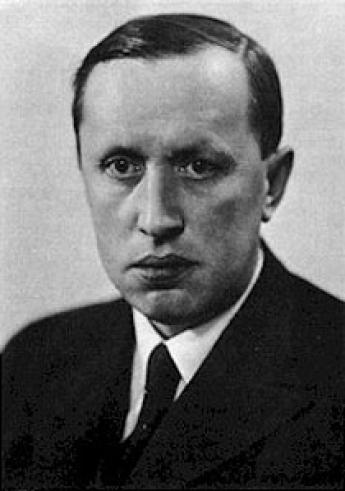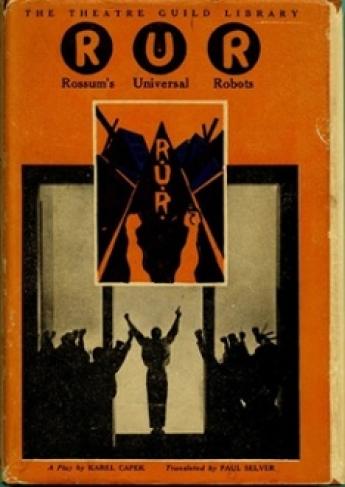Antiquarian Booksellers' Association of America Books Tell You Why, Inc.
Collecting Science Fiction - Karel Äapek and the Origin of the Word Robot

By Stephen Pappas
Karel Čapek’s Czech play RUR, (Rossum’s Universal Robots) is notable for numerous reasons. Written in 1920, the play's commentary on the politics of its day earned its author a spot on the Nazi most-wanted list. RUR details a robot revolution that would overthrow the dominant class, humans, and lead to their extinction. Above all, the play is most well known for introducing the world to the word, "robot." In fact, before Čapek’s play, what we think of as robots were mainly called "androids" or "automatons," with "automaton" meaning a self-operating machine. In Czech, "robota" translates to "forced labor." It’s associated with the type of work done by serfs during the feudal ages.
The critical reception of Čapek’s seminal work was fairly positive. The play was translated into over 30 languages. Arthur Miller said, “I read Karel Čapek for the first time when I was a college student long ago in the Thirties. There was no writer like him...prophetic assurance mixed with surrealistic humour and hard-edged social satire: a unique combination...he is a joy to read.” However, Isaac Asimov said, “Čapek's play is, in my own opinion, a terribly bad one, but it is immortal for that one word.” Good play or not, Asimov was certainly right about the legacy RUR left behind. The term "robot" is used more than "android," and it far outpaces “automaton.” And just as the word, "robot," has embedded itself in popular culture, Čapek’s themes are just as timeless.
Čapek’s writings came on the eve of World War II. His personal politics and the political atmosphere of the time are clear in his works. Čapek was anti-fascist. In fact, he was anti-totalitarian. He opposed both fascist and communist regimes. He wrote about this, as well as nationalism, consumerism, and classism in his plays, all of which still resonate today.
Čapek was named the number two enemy of the Nazi regime in Czechoslovakia. Refusing to flee, Čapek ultimately died of pneumonia on Christmas day in 1938, after Czechoslovakia was annexed to Nazi Germany. Čapek’s brother, a surrealist painter named Josef, whom Karel actually credited with coining the term "robot," would eventually die in a concentration camp. The two worked closely together and collaborated on numerous projects including the plays RUR and Adam Stvořitel (Adam the Creator), and the children's book Dášeňka, čili život štěněte(Dashenka, or the life of a Puppy), which Josef illustrated, among others.
Thanks to Čapek's biting wit, social commentary, and the invention of a word that's now common place, it's safe to say the author and his brother's legacy will live on. With lines like the one that follows from RUR, his work and message remain difficult to ignore.
“Robots of the world, you are ordered to exterminate the human race. Do not spare the men. Do not spare the women. Preserve only the factories, railroads, machines, mines, and raw materials. Destroy everything else. Then return to work. Work must not cease.”
***
Posted on Books Tell You Why, presented here by permission of the author. Pictures: Books Tell You Why.
Do you collect science fiction?

